Address
304 North Cardinal St.
Dorchester Center, MA 02124
Work Hours
Monday to Friday: 7AM - 7PM
Weekend: 10AM - 5PM
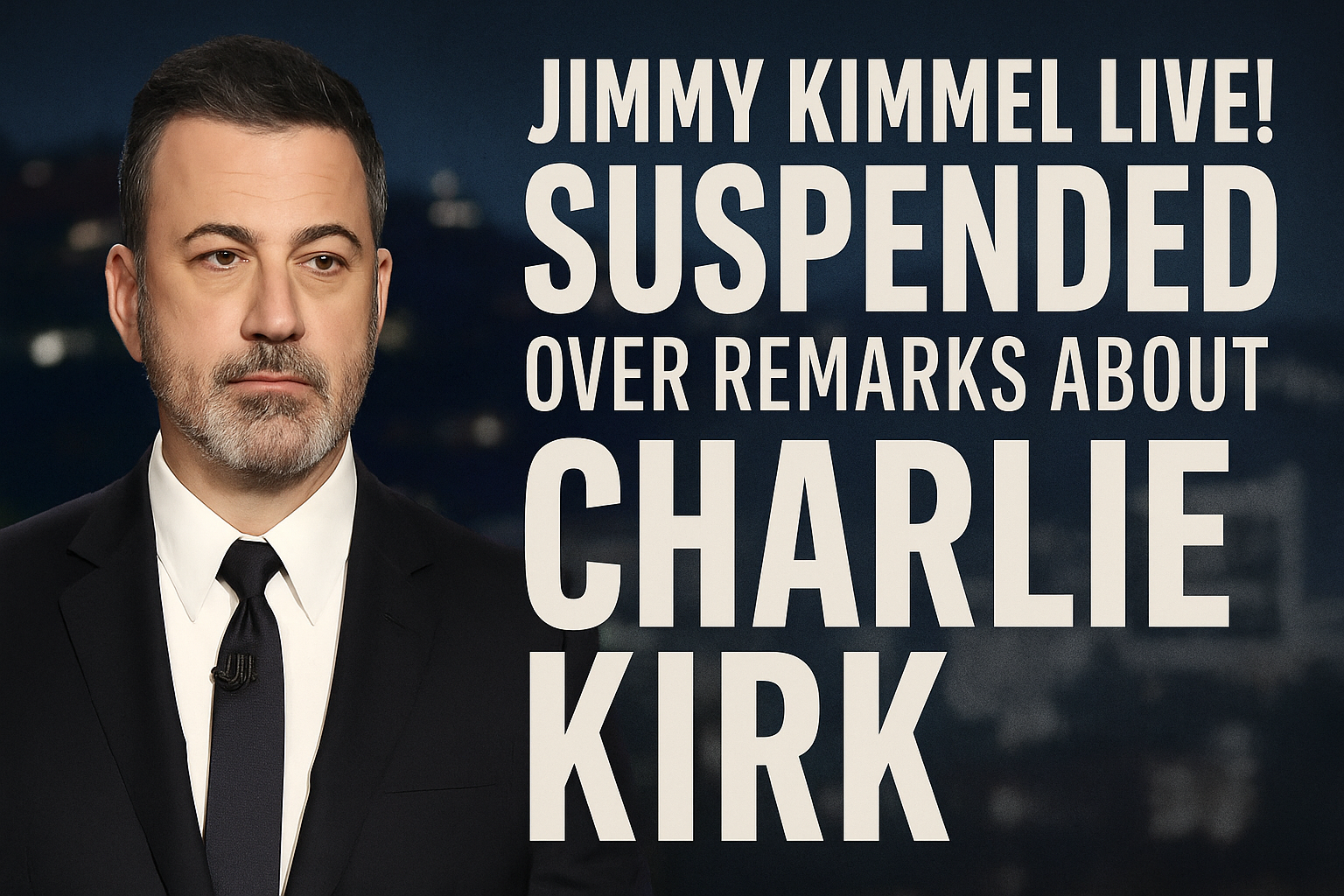
On 15 September 2025, Jimmy Kimmel opened his ABC late‑night show with a monologue addressing the assassination of far‑right activist Charlie Kirk two days earlier. Kimmel criticized the tendency of “MAGA” figures to blame left‑wing radicals for political violence and mocked Donald Trump’s unfounded claims that the alleged killer was a liberal. He remarked that the shooter was actually “one of them” and said the MAGA gang was hitting new lows. These comments triggered an immediate backlash: prominent conservatives led by Fox News, the Daily Wire and the New York Post accused Kimmel of slandering conservatives. FCC chair Brendan Carr called Kimmel’s remarks “some of the sickest conduct possible” and publicly threatened to investigate ABC and Disney for violating the FCC’s “public interest” standarddeadline.com. Within hours Nexstar Media Group, the largest owner of ABC affiliates, announced it would pre‑empt Jimmy Kimmel Live! on its 32 stations, calling the comments “offensive and insensitive” and claiming Kimmel’s show no longer served local community values. ABC and its parent company Disney capitulated, releasing a brief statement that the show would be “pre‑empted indefinitely.”
The swift suspension exposed the fragility of broadcast licensing amid regulatory threats and highlighted a paradox in U.S. free‑speech politics. For years, Charlie Kirk and his Turning Point USA movement positioned themselves as “free speech absolutists.” Kirk launched initiatives such as the Professor Watchlist to expose left‑wing academics and repeatedly criticized universities for so‑called cancel culture. Yet his death spawned a campaign by Republican lawmakers, Fox News commentators and FCC officials to punish Kimmel and anyone who mocked Kirk. Sen. J.D. Vance told supporters that if they saw someone celebrating Kirk’s murder they should “call them out [and] call their employer.” Trump White House Deputy Chief of Staff Stephen Miller, who has promised to obtain revenge for the assassination of Charlie Kirk, proposed using Department of Justice and Homeland Security resources to target such individuals. The conservative “cancel” campaign extended beyond Kimmel: teachers, professors and corporate employees across the country were fired or suspended for online posts about Kirk. This juxtaposition reveals a broader right‑wing practice of invoking free speech to defend their allies while employing legal threats, regulatory pressure and boycotts to silence critics.
This report reconstructs the timeline of events, examines the rhetoric of Charlie Kirk and his allies, and compares the Kimmel suspension with earlier conservative‑led cancellations (Dixie Chicks, Bud Light, Disney, etc.). It concludes that the episode represents an escalation of the free‑speech paradox: regulators and media corporations risk shaping content based on political pressure, and the concept of “free speech” has become a partisan weapon rather than a universal principle.
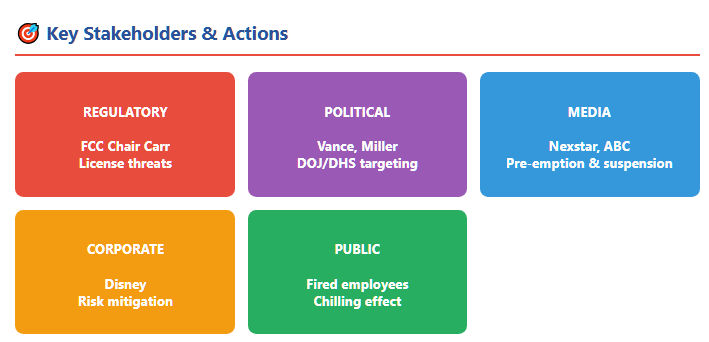
Charlie Kirk, founder of Turning Point USA, was shot and killed on 10 September 2025 in Orem, Utah. The suspected shooter, 20‑year‑old Tyler Robinson, was quickly apprehended. Early law‑enforcement statements indicated that Robinson had been radicalized through a mixture of fringe online communities and right‑wing messaging. Despite limited evidence of a political motive, conservative media figures—led by Donald Trump, Fox News and other conservative commentators—initially promoted the idea that Robinson was a “radical leftist” and suggested the killing was part of an anti‑MAGA conspiracy. These claims provided the context for Kimmel’s on‑air remarks.
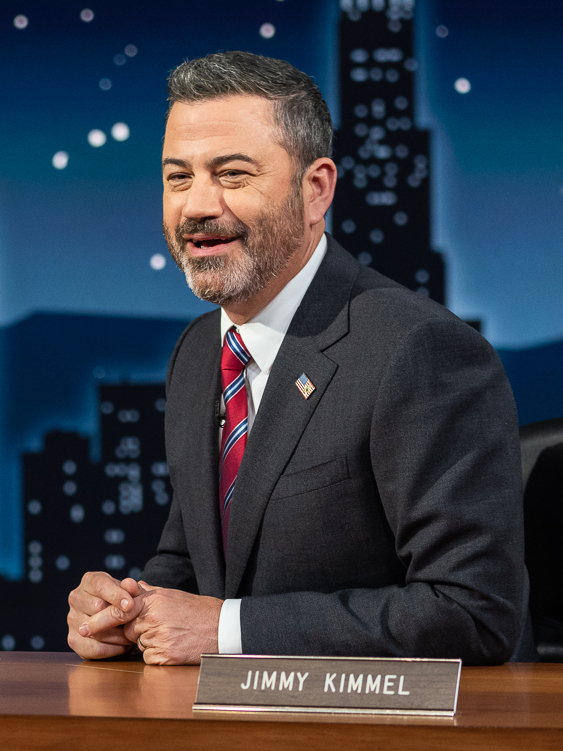
While ABC described the suspension as “indefinite,” the network has not specified conditions for Kimmel’s return. Some analysts speculate that the suspension functions as a de facto firing. With Kimmel’s politics leaning left, and with ABC station-owners insisting that Kimmel donate to Turning Points USA and the Kirk Family, there is a very high likelihood that this is in fact a cancellation of the same type that CBS undertook with Stephen Colbert.
Charlie Kirk built his brand by condemning what he described as the left’s censorship of conservative voices on college campuses. At Turning Point USA (TPUSA) events, he often invoked the First Amendment and labelled himself a “free speech absolutist.” In 2019, Charlie Kirk told Business Insider that he supported free speech even for ideas he found abhorrent. TPUSA’s website features the Professor Watchlist, a database that “exposes” academics accused of spreading left‑wing or pro‑BDS ideologies. Critics liken the list to McCarthyism; one professor told Business Insider it is a tool to intimidate and silence scholars. When reporters asked whether the watchlist contradicted his absolutist stance, Kirk insisted that “more speech” was the correct response and denied that the list was meant to punish professors.
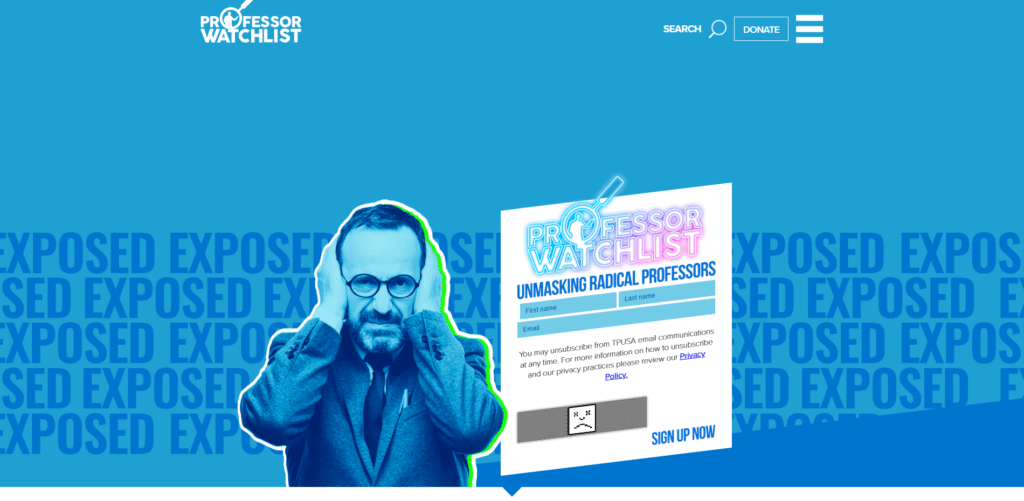
In practice, however, Kirk’s commitment to free speech is selective. He has called for banning the Islamic Student Association at Arizona State University, supported laws to restrict drag performances and joined lawsuits to force universities to cancel pro‑Palestinian events. He also joined other conservatives in advocating for the firing of ESPN commentator Jemele Hill after she called Donald Trump a white supremacist in 2017.
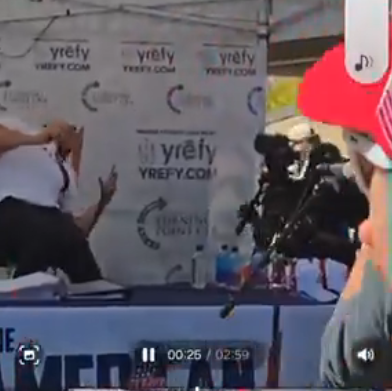
After Charlie Kirk’s killing, his allies launched a sweeping crackdown on speech deemed disrespectful. A community group named “Expose Charlie’s Murderers” published a database of people who posted jokes or memes about the assassination, including their names, employers and addresses. Conservative activists encouraged their followers to contact employers and demand firings. Senators Marsha Blackburn (R‑TN) and Andy Ogles (R‑TN), along with Rep. Clay Higgins, issued statements calling for teachers and university employees who mocked Kirk to be dismissed. The crackdown targeted left‑wing academics (NYU suspended professor Helene Thulin), corporate workers and even high‑school students.
Vice President J.D. Vance, increasingly adopting a law‑and‑order platform, told Fox News: “When you see someone celebrating Charlie’s murder, call them out and, hell, call their employer.” Vance said the Trump administration would consider withholding federal funds from institutions employing such people. Stephen Miller went further, promising to use law‑enforcement agencies to prosecute and exile individuals who mocked Kirk. These statements depict an explicit call for state‑sanctioned punishment of speech – a de facto and de jure violation of the First Amendment.
The crackdown spread beyond rhetorical threats. The PBS NewsHour catalogued numerous firings: a Virginia high‑school staffer lost his job, an Arkansas nurse was suspended, and several professors were placed under investigation. Conservative media lauded these punishments as victories against “haters.”
Right‑wing actors justify the cancel campaign by claiming that mocking an assassination crosses the line between protected speech and “offensive, indecent content.” They argue that the First Amendment does not protect what Vice-President Vance called “violent rhetoric.” However, none of the targeted posts advocated violence; most expressed schadenfreude or harsh criticism of Kirk. FCC chair Carr invoked the “public interest” standard for broadcasters, suggesting that Kimmel’s remarks could be deemed obscene or indecent. This interpretation is controversial because the Supreme Court’s FCC v. Pacifica decision limits the definition of indecency to sexual or explicit content, not political commentary.
Carr’s threat is also incongruous with his previous criticisms of “politicized regulators.” In 2024 he opposed the White House’s initiative to label misinformation on social media, calling it “government censorship.” Yet in 2025 he sought to punish ABC for satire. Anna Gomez, the other Democratic FCC commissioner, publicly rebuked Carr and reminded that the commission cannot legally sanction a network for political speech.
The Kimmel episode illuminates a broader pattern: conservative actors champion free expression when it protects their views but quickly embrace punitive tactics—boycotts, firings, and regulatory pressure—when they feel attacked. This is not new but has intensified as right‑wing media leverage digital campaigns to target perceived enemies. Historically conservatives derided “cancel culture” when companies severed ties with individuals like Gina Carano or Alex Jones; they argued that boycotts and de‑platforming were left‑wing tools. Yet they used the same tactics to punish Bud Light and Disney.
Examining prior instances where conservative actors actively sought to punish speech reveals that the Kimmel affair is part of a long‑standing pattern. A few notable precedents include:
In March 2003, during a London concert on the eve of the Iraq War, Dixie Chicks lead singer Natalie Maines told the audience, “We do not want this war, this violence, and we’re ashamed that the President of the United States is from Texas.” Conservative media and country radio responded with fury. Fans burned CDs, radio stations banned the band’s music and networks like Cumulus Media blacklisted them. The group lost corporate sponsorships and their songs plummeted down the charts; the term “Dixie‑Chicked” became shorthand for being ostracized by conservative audiences. The 19th noted that the backlash served as a cautionary tale for female country artists: “A generation of musicians learned that being too popular, too opinionated, too loud could get you erased.” Even though no regulatory agency intervened, the industry’s self‑censorship responded to political pressure, similar to ABC’s capitulation.
In April 2023 Anheuser‑Busch sent a few commemorative cans to trans TikTok star Dylan Mulvaney. Conservative influencers including Kid Rock and country singer Travis Tritt urged their followers to boycott Bud Light for “going woke.” Kid Rock posted a video of himself shooting Bud Light cans with a rifle and telling viewers to “fuck Bud Light and fuck Anheuser‑Busch”. Fox News hosts echoed the call, and sales of Bud Light declined significantly. Although the boycott was a private-market campaign, it functioned as a cancel movement aimed at punishing a corporation for associating with a marginalized group. Conservatives applauded the decline in sales as evidence that consumers can enforce cultural norms through economic pressure—again contradicting their usual opposition to cancel culture.
When Disney publicly opposed Florida’s HB 1557 (the “Don’t Say Gay” law) in 2022, Governor Ron DeSantis retaliated by moving to dissolve the Reedy Creek Improvement District, the special governing jurisdiction that gave Disney unique control over its property. DeSantis also appointed political allies to oversee Disney’s district and threatened to build a prison near Walt Disney World. Far‑right protestors picketed Disney and conservative media called for boycotts. DeSantis framed his actions as standing up to “woke corporations,” but critics argued he was punishing a company for its speech. Although the conflict eventually settled, it demonstrated how government power can be wielded against corporate speech.
The Kimmel controversy overlapped with a wave of firings. As described earlier, numerous individuals were dismissed after right‑wing activists contacted their employers over social-media posts about Kirk. While some posts were crude, very few advocated violence. The crackdown shows how conservatives now use the same tactics they condemn: contacting employers, pressuring HR departments and celebrating job losses.
The UnHerd article notes that some right‑wing commentators called for law enforcement to infiltrate and disrupt left‑wing groups in response to Kirk’s murder, reminiscent of COINTELPRO. Former Chief of Staff Mark Meadows wrote that the FBI should compile lists of people who posted “hate speech” about Kirk and share them with employers. This echoes historical government surveillance programs and contradicts the idea of a limited state in matters of speech.
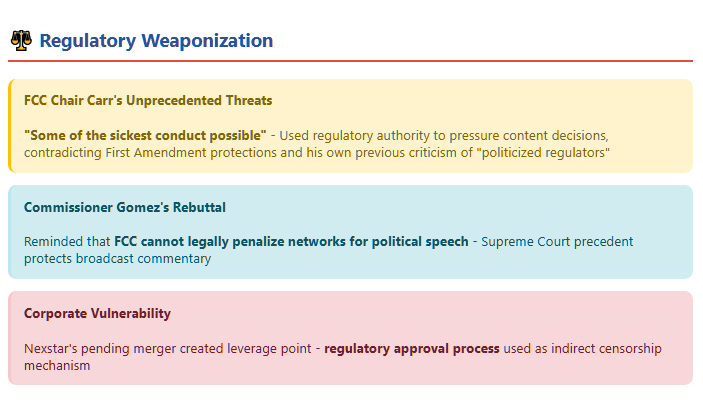
Carr’s threats highlight the vulnerability of broadcast networks to political pressure. The FCC’s authority to revoke licenses for indecency is limited and rarely invoked. If Carr attempted to penalize ABC for Kimmel’s satire, courts would likely strike it down. Yet the mere threat was enough to prompt self‑censorship. Nexstar’s pending $6.2 billion merger with Tegna added pressure, as the company needed FCC approval; this created an environment where political actors could extract concessions by hinting at regulatory obstacles. The event underscores how broadcasters dependent on federal licenses may prioritize appeasing regulators over defending free speech.
Late‑night comedians have historically pushed boundaries. Bill Maher’s Politically Incorrect was cancelled by ABC in 2002 after he said the 9/11 hijackers were not cowards. Now Kimmel, an established network host, faces an indefinite suspension for satirizing right‑wing spin. The message to other comedians is clear: jokes about conservative figures may cost them their jobs if they are broadcast over public airwaves. Cable and streaming hosts (John Oliver, Samantha Bee) can push the envelope because they are not subject to FCC licensing; network comics may become more cautious, reducing the diversity of political satire on free television.
The phrase “public interest” in communications law has been interpreted broadly, but historically it has not encompassed political commentary. By arguing that Kimmel’s satire was indecent, Carr and his allies are expanding the concept to include subjective moral judgments. If such an interpretation gained traction, regulators could target any show that offends a vocal constituency. The threat thus functions as a weapon to enforce partisan norms. It also flips the long-standing conservative argument that the First Amendment protects offensive speech.
The free‑speech paradox is not limited to one side of the political spectrum, but this episode illustrates how conservatives have adopted the same tactics they condemn. Kirk’s supporters rationalize punishing speech because the target is “offensive.” This mirrors left‑wing activists who call for deplatforming hateful speakers. The difference is that conservatives now couple boycotts with government action, creating a hybrid model of state and market pressure. By selectively applying free‑speech absolutism, they reduce the principle to a weapon for their own cause, undermining its universal appeal.
America has witnessed increased political violence. Each incident generates partisan narratives, often casting blame on ideological opponents. If broadcast networks respond to every outcry by suspending or firing hosts, they risk becoming tools of whichever faction mobilizes the loudest outrage. The Kimmel suspension may embolden activists and regulators to target other journalists and entertainers, leading to a chilling effect on critical coverage of political movements. It also signals to political actors that they can leverage regulatory levers to shape media narratives.
Healthy democracies require robust, even uncomfortable, public debate. The Kimmel case demonstrates how easily the goalposts can shift. A comment meant to criticize hypocrisy becomes grounds for cancellation. The reaction underscores that many self‑described free‑speech defenders are more interested in protecting speech they agree with than in defending the principle itself. The episode may further polarize the discourse, as progressives highlight conservative hypocrisy and conservatives double down on victimhood narratives.
The way you framed Kimmel’sBlog comment creation guide suspension as part of a broader free-speech paradox is really interesting—especially since it highlights how platforms and networks often respond more to political pressure than to clear policy violations. What stood out to me is how OSINT can reveal the disconnect between what’s officially stated and the underlying motivations, which makes these moments less about one celebrity and more about the precedent being set for public discourse.
What stands out here is how Kimmel’s suspension highlights the double-edged nature of free speech in a polarized media landscape. It raises the question of whether platforms and networks are protecting audiences or simply reacting to political pressure. I’d be curious to see more exploration of how OSINT can track these decision-making patterns across different media outlets.
This piece highlights a really interesting tension between the public’s expectation of free expression and the corporate or regulatory decisionsBlog comment creation guide that can silence it. The use of OSINT to trace how narratives around Kimmel’s monologue spread is especially useful because it shows how quickly a framing can harden before the facts are even settled. It makes me wonder how much of what we perceive as ‘cancellation’ is actually about speech itself versus the information ecosystems that amplify or suppress certain voices.
What strikes me here is the tension between free speech as a legal protection and free speech as a cultural value. The suspension of a show like Kimmel’s raises the question of whether we’re protecting audiences from harm or just narrowing the range of perspectives allowed in mainstream media. It feels like this case highlights how easily the principle of free expression gets reshaped depending on who’s speaking and who’s listening.
What struck me about this piece is how the suspension of Kimmel’s show highlights the double standard around free speech—networks often bend under political pressure while claiming neutrality. It raises the question of whether media companies are protecting public discourse or simply shielding themselves from backlash. The OSINT approach here helps show just how layered the power dynamics really are.
The idea that free speech can be both protected and restricted based on who’s making the statements is something I’ve been thinking about lately. This Kimmel case seems to reveal just how easily the lines blur between comedy, political commentary, and actual censorship.